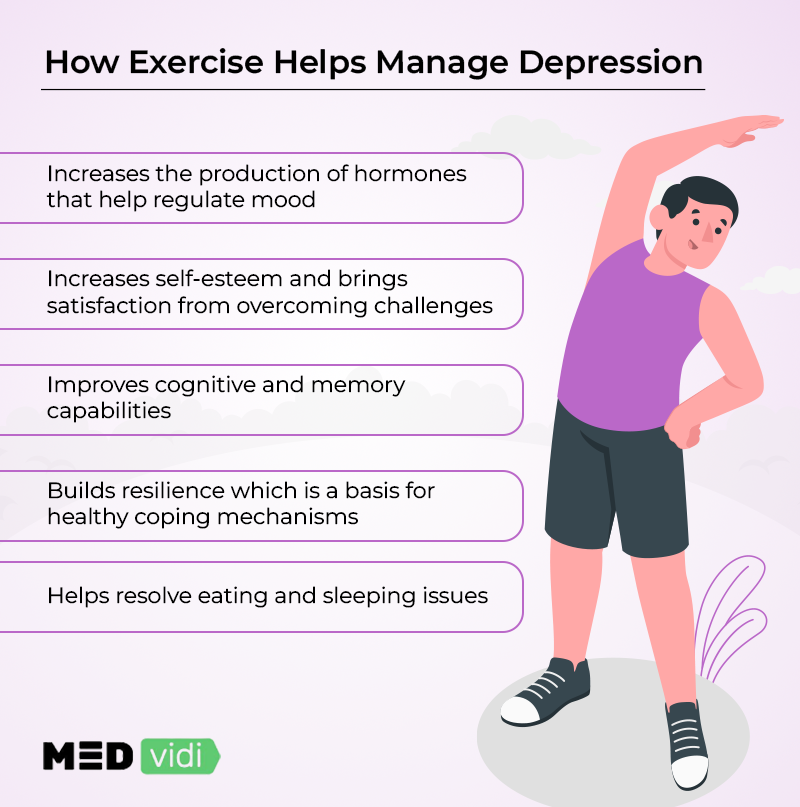According to the World Health Organization, depression is one of the most prevalent disorders; it affects approximately
Depression differs from regular mood swings, which are emotional reactions to everyday problems. It can also come with restlessness, anxiety, guilt, anger, lethargy, changes in sleep and appetite, and suicidal ideations in severe cases. According to
However, effective treatments can help improve mental health. Several types of medications and psychotherapy bring positive results in managing depression. Moreover, patients can boost the efficacy of these methods by implementing lifestyle changes. Below, we will review several of them focusing on regular exercise and its benefits for depression treatment.
Get personalized depression treatment at MEDvidi.
How Does Exercise Help Depression?
Depression usually makes a person lethargic and leads to decreased energy, which may discourage physical activity. At the same time, people can significantly reduce depression symptoms if they exercise for
How exactly do exercise and mental health correlate? It helps fight the disorder in the following ways:
- Increases the production of feel-good hormones like serotonin, dopamine, and endorphins. These hormones regulate mental, emotional, and behavioral patterns.
- Increases self-esteem. Physical improvement increases the person’s
self-confidence[4] , and workouts bring satisfaction from overcoming challenges. - Improves cognitive and memory capabilities. Routine exercise requires concentration and mental focus. Physical exertion also stimulates the
oxygen supply[5] to the brain,production of new brain connections[6] , and reduces aging. - Builds resilience. Exercise requires a person to use physical, mental, and emotional effort to achieve the desired milestone. Stamina builds healthy coping mechanisms.
- Resolves eating and
sleeping[7] issues that may also be symptoms of depression. The exhaustion from energy-consuming activities ignites better sleep patterns. Also, physiological processes boosted by exercise help reduce the tendency to overeat and improve digestion.
Learn more about the available treatment options from mental health experts,
How to Start Routine Exercise for Depression
- Starting small. Setting small goals at the beginning contributes to more achievements. Then the person may switch to demanding milestones when exercise becomes routine.
- Choosing a favorite activity. Engaging in a favorite activity motivates people better even when their minds and bodies are lethargic.
- Consulting a specialist. If a person has not had exercises for a long time and is concerned about the effects, it is prudent to seek a doctor’s opinion and train with a personal coach.
- Make exercise a social activity. To remain motivated, one can make exercise a social activity. Exercising with others will form healthy relationships and a sense of belonging to a community, which benefits a person with depression.

Other Natural Remedies for Mental Health Treatment
Aside from medications, psychotherapy and natural remedies may help treat mental health illnesses such as major depression.
Cognitive behavioral therapy (CBT) is the most common option chosen to treat depression, especially mild or moderate. This therapy helps to restructure unhealthy thought patterns that ignite negative emotions and behavior. The patient acquires coping skills that enhance a positive mindset.
In addition, the following techniques can be used:
- Gratitude writing. One can practice gratitude writing by journaling, focusing on thankful thoughts, or writing notes to re-experience positive occurrences. One can also re-read gratitude notes to re-experience happy circumstances.
- Supplements and nutrients. Vitamins B9 and B12 are vital minerals for a healthy nervous system and natural antidepressants. The vitamins produce serotonin, dopamine, and norepinephrine — these neurotransmitters regulate behavioral, cognitive, and emotional patterns. A
nutritious[8] diet rich in these nutrients can promote mental health. - Stress management techniques. A patient can overcome stress through relaxation techniques like mindfulness, progressive muscle relaxation, guided meditation, and controlled breathing.
- Music therapy. When a person listens to or sings their favorite music, it changes emotions and mood. Music refocuses negative thoughts and feelings in a positive direction.
- Yoga. Yoga is a popular and recognized relaxation technique. It may include guided meditation, body movements, and breathing exercises. Yoga enables a person with depression to improve body posture and breathing patterns.
Does self-help seem not enough? Ask for professional help and get individually chosen medications.
Conclusion
Exercise helps a person with depression, especially when the condition is mild or moderate. The routine exertion alters mental focus from a negative to a positive direction. Regular exercise can naturally increase energy, ignite the production of feel-good hormones, and resolve eating and sleeping disorders. However, exercise alone may not be as effective as psychotherapy or medications. Consider consulting a doctor to know what treatment plan will help you best.











